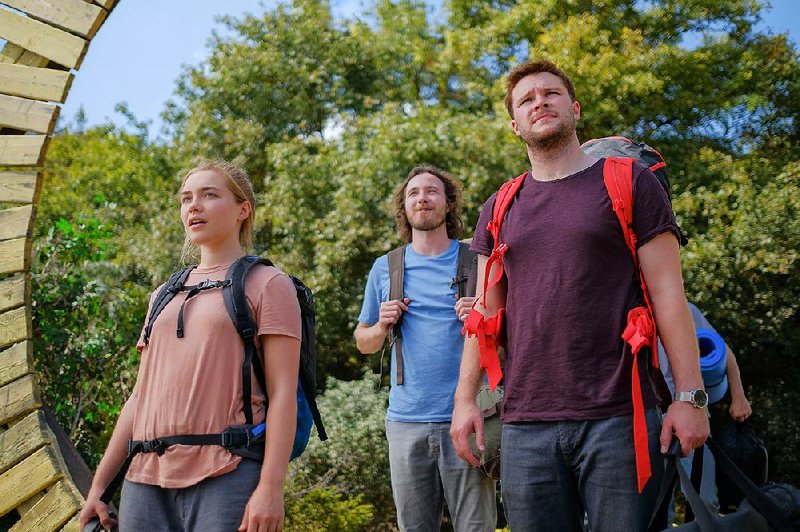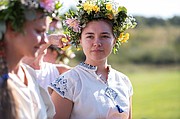Ari Aster's psychotropic horror treatise Midsommar takes as its primary source of anxiety the ever-shifting power dynamics between people, both romantically, and in communities, and what it has to say is anything but reassuring.
The film begins with an anxious young woman, Dani (the magnificent Florence Pugh), sitting alone in her small studio apartment, having received yet another disturbing message from her bipolar sister via social media, threatening -- yet again -- suicide. Dani, a nervous sort, one imagines largely because of growing up with an unstable sister, debates calling her boyfriend, Christian (Jack Reynor), about it, loathe as she is to disturb him when he's out with friends. But she's also deeply scared about her sister's words (she mentions her parents "will be joining her" before saying "goodbye"), so she hesitatingly picks up the phone and calls him -- a moment Pugh captures absolutely perfectly with Dani's suppressed panic, trying hard to sound nonchalant to the oblivious Christian, even as her face betrays her apprehension to us.
And here is where Aster, who wrote the screenplay as a follow-up to his powerful debut feature Hereditary, first indicates the crux of his premise. As she calls Christian, the scene shifts to the bar where he's hanging out with his grad student friends, including Josh (William Jackson Harper), Mark (Will Poulter), the film's comic relief (such as it is); and Pelle (Vilhelm Blomgren), a soft-spoken Swede studying in the States. When Christian's phone buzzes with Dani's call, Mark and Josh react indignantly. Mark especially sees her as a perpetual buzzkill, a droning downer who always makes poor Christian drop everything fun in order to take care of her for some new trumped-up family emergency. According to Mark, Christian needs to dump her already (it's indicated they've been together close to four years) and hook up with a more sunnily disposed girlfriend who "actually likes sex," among other things.
Christian, ever stout, if wavering, does answer, however, and settles into his normal role as caretaker, trying to calm Dani down and talk her out of her worst fears. She wants him to come over later, and we are to understand via his friends' exasperation, that as much as Christian might resent his girlfriend, he still feels emotionally obliged to support her. It's a concession he makes not entirely willingly, as the scene suggests Dani could be a born hysteric, one of those morose people perpetually stuck in melancholia of one order or another, preying on more even keel partners as a drowning victim latching onto a would-be good Samaritan, taking them both down to a watery grave.
When it happens, in this case, that Dani's fears are actually realized Christian is again further locked into this relationship he and his friends very much wanted him to abandon. When he does invite her to the group's summer trip to Sweden to see Pelle's home commune, and to take part in the community's special 90-year celebration, it's as an afterthought -- a courtesy that she will no doubt decline. Instead, she surprisingly accepts, and it is only the sweetly countenanced Pelle, in a touch of well-placed foreshadowing, who seems genuinely glad for her to be joining them.
To Aster's considerable credit, it's difficult to blame Christian for his less than fully sympathetic approach to Dani. She's a mess, prone to panic attacks and crying jags. And she'll put a damper on what Mark (and likely Christian) saw as an opportunity to meet hot Swedish commune women. She's the consummate female wet blanket trope, only made more complex by Aster's shifting terms of sympathy. We understand her pain is all too real, and justified, even as the film suggests Christian's emotional wavering is also understandable. By the time they land in Europe, it's clear the new terms of their relationship place him in the unenviable position of parenting his partner, always checking in with her, making sure she's OK, protecting her from the glaring harshness of the outside world.
In the power structure between them, it also squarely puts him in control of their relationship: In lieu of her family, she heaps all that responsibility on Christian, leaning on him at an acute angle, and letting him shepherd her through her grief as her lone support. At the point they arrive at Pelle's beautiful, woodsy commune -- where everyone wears long, white, flowing robes, and women are adorned with vibrant crowns of flowers in their hair -- Dani is a nearly empty vessel, wandering around in a haze of misery and coping techniques ("You're OK," she whispers to herself as a mantra when she attempts to quell yet another panic attack).
It is thus when, during the increasingly macabre celebrations at Pelle's cultish compound, the power dynamics slowly begin to shift. In a community in which Christian, Josh and Mark are all complete outsiders -- though the former two embrace this status, keeping professional distance in order to make the commune the subject of their doctoral dissertations in psychology -- it becomes obvious they no longer control the narrative. As open-minded and embracing as the community first appears, by the end of the travelers' first morning, witnessing the ritualized suicide of an elderly couple off a mountain precipice, it's clear everyone is in way over their heads, even as the psychology students do their level best to stay objective (a couple of Brits, friends of Pelle's brother, have a far less measured response and demand to be taken back to the train station immediately -- this does not turn out well for them).
Here, Dani's otherwise unfortunate unmooring in the outside world ultimately works to her advantage within the tight confines of this peculiarly menacing and controlling micro-society. With nothing, save Christian, anchoring her to any time or place, she's much more disposed to adapt to these baffling new surroundings and embrace the exalted position she is suddenly placed into far more than the others.
Viewing Aster's films is a bit like walking into an art installation -- quite literally, as he populates his frame with stunning compositions and art-focused mise en scene, as with the beautifully designed wooden structures of the compound, or the exquisite murals and art displayed on the building's walls (a huge shout-out to his production designer, Henrik Svensson, and the art directing crew) -- but, as with Hereditary, behind all the sumptuous, hand-crafted beauty, there is a cruel, brutal core of humanity's continued savagery. If art represents the best sort of impulses of humankind, in Aster's hands, it becomes yet another facade, hiding -- or in this case, exemplifying -- our instinct for vicious barbarity. Notably, much of the art in the compound, either textile or ceramic, features depictions of the ordeals to come for the four outsiders, albeit artfully represented, something that is hardly unnoticed by the travelers, who seem to take it, and the compound's peculiarities in general, well in stride until it's too late.
By the end, Dani, now having gained further connection beyond Christian in the commune, sees him as dispensable, a sacrifice that serves to sever her lone tie to the outside world and the life that made her so miserable and anxious. For his part, struck dumb and motionless, Christian has no choice but to accept his fate (and, yes, the criticism suggesting his name is one of the few times Aster overplays his hand is not unjustified), possibly as a final conciliatory gesture to his once-lover, like a Giving Tree parable turned violent and grotesque, even though he has no actual choice in the matter.
The relationship dynamic turned on its head, now that Dani has strengthened her bond to this new community, Aster coyly summarizes the all-consuming human need for connection and belonging, even as it asks you to throw everything you once knew and cared about into a literal bonfire. As human beings, we are all subject, it would seem, to the whims and cruel indoctrinations of those around us.
MovieStyle on 07/26/2019

